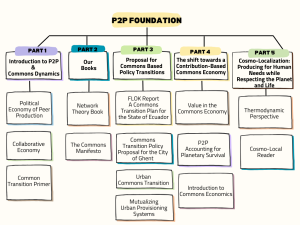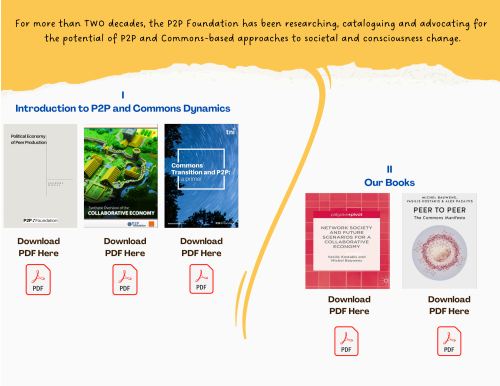User:MDEE/Test: Difference between revisions
No edit summary |
No edit summary |
||
| Line 56: | Line 56: | ||
'''Keywords:''' #UrbanCommons #ParticipatoryGovernance #EcologicalEconomy #PublicCommonsPartnership | '''Keywords:''' #UrbanCommons #ParticipatoryGovernance #EcologicalEconomy #PublicCommonsPartnership | ||
[[File:Medium1.png| thumb|center|500px|Parts I and II]] | |||
Revision as of 15:19, 22 November 2024
Test Page images

I. Introduction to P2P and Commons Dynamics
1.Political Economy of Peer Production. Bauwens, M. (2005). The Political Economy of Peer Production. CTheory. PDF
This is the foundational text that offers the definition and first analysis of the meaning of the emergence of peer production, and what it means for our human society and productive capacity. Peer production is essentially about ‘trans-local’ self-organization, a new capacity of humanity to coordinate voluntary work at a global scale. We ask the question of how this new capacity relates to the institutions and practices of the market, capitalism, and the state.
Keywords: #PeerProduction #CollaborativeEconomy #CommonsTheory #DecentralizedGovernance
2.Synthetic Overview of the Collaborative Economy. Bauwens, M.et al. (2012). Synthetic Overview of the Collaborative Economy. P2P Foundation & Orange Labs. PDF
In this report we explore the full set of collaborative economic practices that co-emerged with the internet and the web,, such as: commons-based peer production (Yochai Benkler), wikinomics (Don Tapscott), crowdsourcing (Jeff Howe), open innovation (Henry Chesbrough), and collaborative consumption (Rachel Botsman). We ask: how do these new horizontal practices impact hierarchical corporations and the global economy.
Keywords: #CollaborativeEconomy #PeerProduction #OpenInnovation #CommonsEconomics
3.Commons Transition Primer. Bauwens, M.et al. (2017). Commons Transition and P2P: A Primer. Transnational Institute (TNI) and P2P Foundation. PDF
In this simplified and illustrated presentation, we summarize the principles and practices of the commons, especially as to how it affects the state and market. The work presents a pioneering transition program that outlines this transformation in political and policy terms, based on the experiences of the P2P Foundation advising the Ecuadorian government, and the city of Ghent.
Keywords: #CommonsTransition #P2PEconomy #SocialGovernance #OpenCooperativism
II. Our Books
1.Network Theory Book. Kostakis, V. and Bauwens, M., (2014). Network Society and Future Scenarios for a Collaborative Economy. Palgrave Macmillan. PDF
This was the first published book of P2P Foundation authors, in which we outline four potential scenarios for the emergent networked society.
In the first scenario, based on the centralized extraction of peer to peer dynamics in false commons, large corporations extra our data and attention, extracting rent from our own collaboration and exchanges.
In the second scenario, based on the emerging world of crypto and web3, the world and its infrastructures are design to that every citizen becomes an entrepreneur, potentially liberated from the control of big government and big finance
In the third scenario, bottom-up urban and rural commons projects, take control of the provisioning and use of food, transport, housing, etc .. based on the potential of p2p and commons dynamics
In the fourth scenario, global digital commons of knowledge, software and design, create common knowledge and cooperation protocols that allow local projects to scale and cooperate globally.
Bear in mind that these are four worlds that are co-emerging and mixing as we speak, but this is in our view the great ‘infrastructural’ struggle of our age. Which scenario will prevail?
Keywords: #NetworkSociety #CollaborativeEconomy #PeerToPeer #FutureEconomics
2.The Commons Manifesto. Bauwens, M et al. 2019. Peer to Peer: The Commons Manifesto. London: University of Westminster Press. PDF
What is peer to peer? Why is it essential for building a commons-centric future? How could this happen? These are the questions this book tries to answer. Peer to peer (P2P) is a type of social relations in human networks, as well as a technological infrastructure that makes the generalization and scaling up of such relations possible. We believe that these four aspects will profoundly change human society. P2P ideally describes systems in which any human being can contribute to the creation and maintenance of a shared resource while benefiting from it. There is an enormous variety of such systems: from the free encyclopedia Wikipedia to free and open-source software projects, to open design and hardware communities, to relocalization initiatives and community currencies. Thus, P2P enables a new mode of production and creates the potential for a transition to a commons-oriented economy.
Keywords: #UrbanCommons #ParticipatoryGovernance #EcologicalEconomy #PublicCommonsPartnership
